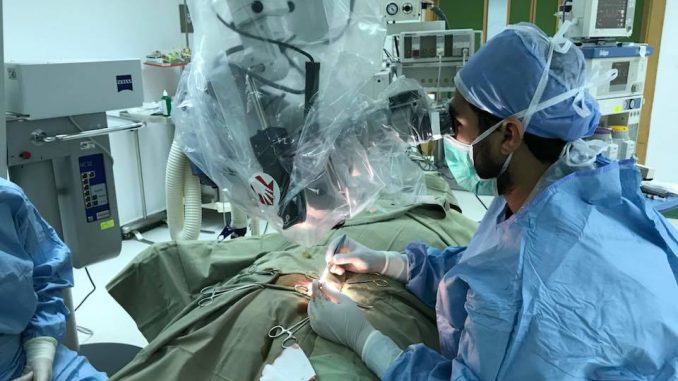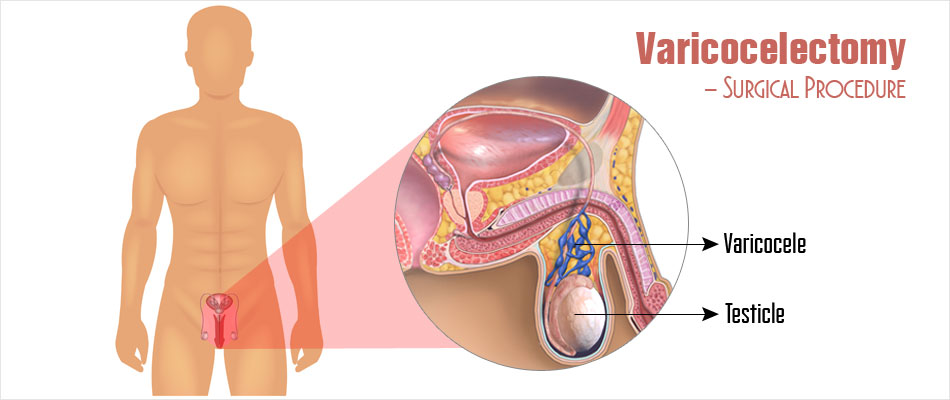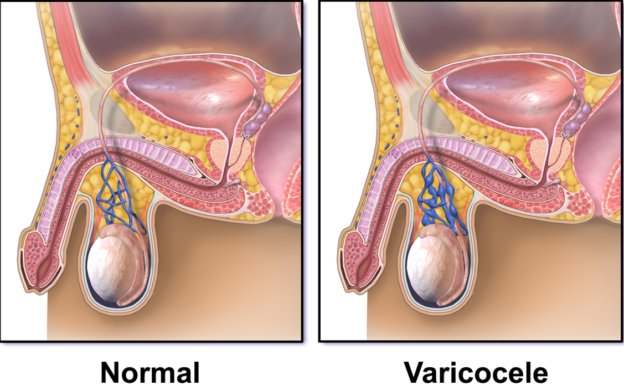
Varicocele Ka Ilaaz :
What is a varicocelectomy?
A varicocele is an enlargement of the veins in your scrotum. Varicocelectomy may be surgery performed to get rid of those enlarged veins. The procedure is completed to revive proper blood flow to your reproductive organs. When a varicocele develops in your scrotum, it can block blood flow to the rest of your reproductive system. The scrotum is the sac that contains your testicles. Because blood can’t return to your heart through these veins, blood pools in the scrotum and the veins become abnormally large. This can decrease your sperm count.
Also Read: Lost Interest in Sex? Know Reasons of Decreasing Sex Power
Who’s a good candidate for this procedure? (Varicocelectomy)
Varicoceles occur in about 15 percent of adult men and 20 percent of teen males. They don’t usually cause any discomfort or symptoms. If the varicocele doesn’t cause pain or discomfort, your doctor may suggest leaving it as is to avoid the risks of surgery. Varicoceles often appear on the left side of your scrotum. Varicoceles on the right side are more likely to be caused by growths or tumors. If you develop a varicocele on the proper side, your doctor might want to perform a varicocelectomy, also as remove the expansion.
Infertility is a common complication of a varicocele. Your doctor may recommend this procedure if you want to have a child but are having trouble conceiving. You may also want to undergo this procedure if you’re experiencing any side effects of decreased testosterone production, such as weight gain and reduced sex drive.
How is this procedure performed?(Varicocelectomy)
Varicocelectomy is an outpatient procedure. You’ll be able to go home the same day.
Also Read : Lost Interest in Sex? Know Reasons of Decreasing Sex Power
Before the surgery:
Let your doctor know if you’re taking medications or supplements. Stop taking any blood thinners, such as warfarin (Coumadin) or aspirin, to lower your risk of bleeding during the surgery.
Follow your doctor’s fasting instructions. You may not be able to eat or drink for 8 to 12 hours before the surgery.
Have someone take you to and from the surgery. Try to take the day off work or other responsibilities.
When you arrive for surgery:
You’ll be asked to remove your clothes and change into a hospital gown.
You’ll lie down on a surgical table and be given general anesthesia through an intravenous (IV) line to keep you asleep.
Your surgeon will insert a bladder catheter to remove urine while you’re asleep.
The most common procedure is a laparoscopic varicocelectomy. Your surgeon performs this surgery using several small incisions, and a laparoscope with a light and camera to see inside your body. Your surgeon might perform an open surgery, which uses one large incision to allow your surgeon to see inside your body without a camera.

To perform a laparoscopic varicocelectomy, your surgeon will:
make several small cuts in your lower abdomen
insert the laparoscope through one of the cuts, allowing them to see inside your body using a screen that projects the camera view
introduce gas into your abdomen to allow more space for the procedure
insert surgical tools through other small cuts
use tools to cut any enlarged veins that are blocking blood flow
seal off the ends of the veins using small clamps or by cauterizing them with heat
remove the tools and laparoscope once the cut veins are sealed
Also Read : Lost Interest in Sex? Know Reasons of Decreasing Sex Power
What’s recovery like from the procedure? (Varicocelectomy)
The surgery takes about one to two hours. Afterward, you’ll be placed in a recovery room until you wake up. You’ll spend about one to two hours recovering before your doctor clears you to go home.
During your recovery at home, you’ll need to:
take any medications or antibiotics that your doctor prescribes
take pain medications, such as ibuprofen (Advil, Motrin), to manage your pain after surgery
follow your doctor’s instructions for cleaning your incisions
apply an ice pack to your scrotum for 10 minutes several times a day to keep swelling down

Also Read : Lost Interest in Sex? Know Reasons of Decreasing Sex Power
What are the possible side effects of this procedure?(Varicocelectomy)
See your doctor directly if you notice any of the following:
fluid buildup around your testicle (hydrocele)
difficulty peeing or fully emptying your bladder
redness, inflammation, or drainage from your incisions
abnormal swelling that doesn’t respond to cold application
infection
high fever (101°F or higher)
feeling nauseous
throwing up
leg pain or swelling
Does this procedure affect fertility?
This procedure can help increase fertility by restoring blood flow to your scrotum, which can result in increased sperm and testosterone production.
Your doctor will perform a semen analysis to ascertain what proportion your fertility improves. Varicocelectomy often results in a 60–80 percent improvement in semen analysis results. Instances of pregnancy after varicocelectomy often rise anywhere from 20 to 60 percent
